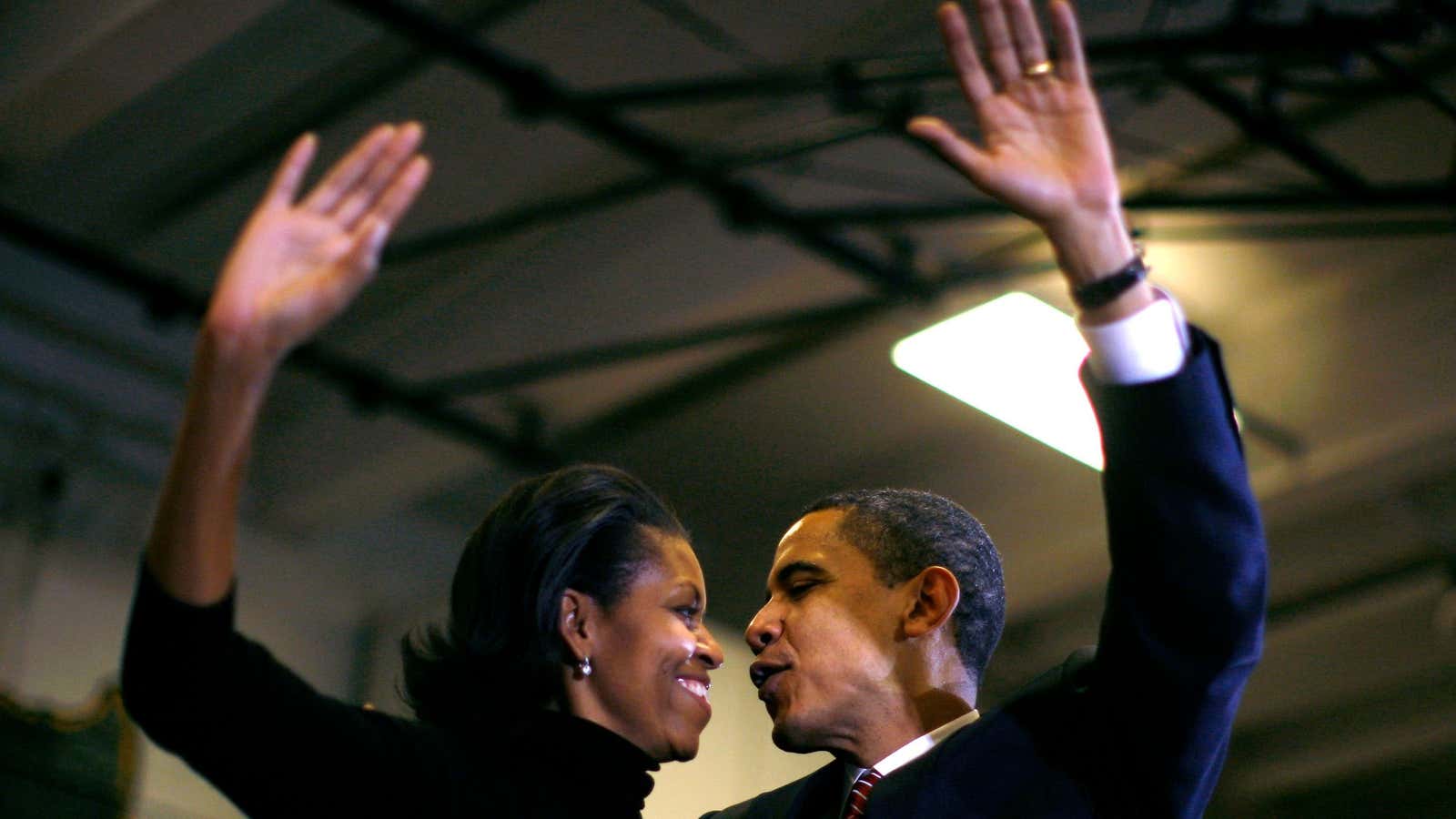From the outside looking in, Barack and Michelle Obama appear to have a killer relationship. They seem to revel in each other’s company, challenge each other in healthy ways, and create protected space for their family—no small feat when their home for eight years was the White House. There’s romance, and substance. Dreamy.
But in her memoir Becoming, Michelle Obama lets on that it wasn’t always smooth sailing. After the couple had young kids, and she was a high-powered lawyer, Michelle often found herself on the hook for dinner, bath time, books, and bedtime. Barack, she notes, had an “optimistic” sense of time: He would often call to say he was on his way home, then wouldn’t turn up for awhile. In an interview with Michelle in Elle this week, Oprah said she could hear the former first lady’s anger through the page. Michelle responded:
I was mad. When you get married and have kids, your whole plan, once again, gets upended. Especially if you get married to somebody who has a career that swallows up everything, which is what politics is. Barack Obama taught me how to swerve. But his swerving sort of—you know, I’m flailing in the wind. And now I’ve got two kids, and I’m trying to hold everything down while he’s traveling back and forth from Washington or Springfield.
What she learned—what most of us learn—is that that thing that attracts you to your partner often becomes the thing that drives you bananas. She’s the box-checker and he’s the “swerver,” which was awesome when they were complementing each other. But after having kids, Michelle kept checking boxes, while Barack was still swerving. She believed in what he was doing—fixing inequality, making communities stronger, politicking—but day-to-day conflicts stewed.
So they went to therapy. Michelle thought a counselor would help Barack see the shortcomings of his ways (most of us start this way: a referee! And I will win! ) “You go because you think the counselor is going to help you make your case against the other person. ‘Would you tell him about himself?!’ ” Michelle told Oprah.
Instead, she discovered that she needed to figure out how to make herself happy, and to be clear about the support she wanted from Barack. “I needed to figure out how to build my life in a way that works for me,” she told Oprah.
Many of us go into marriage with some Jerry Maguire-inspired preconceptions: He/she will complete me. We will share everything. We will divide all chores and kid stuff, 50/50, start to finish.
Then reality gets in the way. You realize that you’re heading into a lifetime of learning how to live with another person, a person who has way different needs than your own, whose history is woven into their fabric of what the future will be in ways they don’t even know yet. Barack needed to swerve, while Michelle’s very nuclear upbringing meant being home for dinner together was important to her. As one person put it in a review (paywall) of my own book about marriage:
When I was single, I was regularly baffled by the behaviour of my married friends, male and female. Every time I witnessed one of those “I told you we needed milk” conversations, I thought: “Blimey, just nip out and get some, it’s not the end of the world.” Marriage, from the smug slopes of singlehood, looks like a doddle that’s being messed up by stressed-out, small-minded people. Right up to the point that I got married four years ago, I assumed my marriage would be different — all love and easy sharing.
This is where therapy becomes helpful: to try and identify what you need, what love language you speak, and what your partner speaks (if you don’t know about Gary Chapman’s love languages, you need to). You figure out whether you can offer what your other is asking for, and whether they can give you what you need in return. It requires vulnerability, honesty, and ultimately, a huge amount of compromise. Some make it, some don’t.
The Obamas did, and we got to benefit from a scandal-free eight years (thanks guys!) Shortly before the end of his presidency, Barack wrote an essay in Glamour, apologizing for dumping so much of the parenting on Michelle. “I’ve seen how Michelle has balanced the demands of a busy career and raising a family,” he wrote. “Like many working mothers, she worried about the expectations and judgments of how she should handle the trade-offs, knowing that few people would question my choices.”
The first time I read that, I thought, “he gets it!” But Becoming teaches us that that such inspired thinking was not innate, or even inspired. It likely came from the same place it does for most couples: hard damn work. Counseling included.
